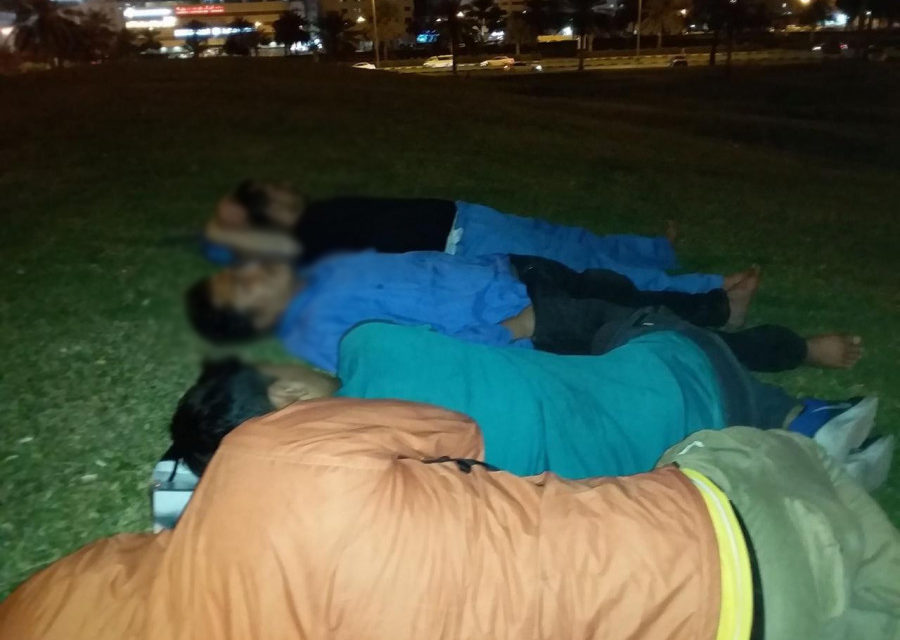Dozens of Nepali worker have already been forced to live on the streets with no shelter and nothing to eat after quitting their jobs.
For a month, the empty streets and parks of Sharjah, the third-largest city in the United Arab Emirates, were home to Ramesh Budhathoki and nearly 40 other Nepali worker.
From mid-February to mid-March, they slept on the sidewalks and in public parks, surviving on food distributed by the Nepali community and others. After they resigned from their job, which was neither paying them as promised nor providing accommodation, they had been left to wander the streets with no place to live and no money to feed themselves.
“We have slept under the open sky and survived on water for many nights,” Budhathoki told the Post over the phone from Sharjah.
It was only on March 20 that the UAE chapter of the Non-Resident Nepali Association managed to pay for two rooms for 40 of them, which is where Budhathoki has been living since. But the NRN has only paid a month’s rent and if they do not cover the next month, the rooms will have to be vacated soon.
Budhathoki and his friends all migrated to the UAE to work as taxi drivers for Emirates Cab seven months ago, in September last year.
They had been promised 1,500 dirham, approximately Rs49,585, as salary and an additional 300 dirham for food, besides accommodation. But in December, once they were given taxis, they were evicted from the company’s apartments.
“We thought we would be fine renting apartments on our own as our salary was just days away,” said Budhathoki.
But their salary came as a shock. They were paid between 100 and 200 dirham, when it cost them an average of 300 dirham for accommodations and another 300 for food.
All of them resigned on February 11 and approached the Nepali embassy in Abu Dhabi. They all wanted to come back to Nepal. After negotiating with the company, 10 Nepalis returned home.
But by the time they were scrambling between the Nepali embassy and their employer in order to get paid and fly back home, Covid-19 began to sweep the world and cases began to rise in the UAE, leading the country to seal the border on March 26 with a partial lockdown in place, which included a night curfew from 8 pm to 6 am every day. On April 5, the UAE government announced a complete two-week lockdown.
But their salary came as a shock. They were paid between 100 and 200 dirham, when it cost them an average of 300 dirham for accommodations and another 300 for food.
All of them resigned on February 11 and approached the Nepali embassy in Abu Dhabi. They all wanted to come back to Nepal. After negotiating with the company, 10 Nepalis returned home.
But by the time they were scrambling between the Nepali embassy and their employer in order to get paid and fly back home, Covid-19 began to sweep the world and cases began to rise in the UAE, leading the country to seal the border on March 26 with a partial lockdown in place, which included a night curfew from 8 pm to 6 am every day. On April 5, the UAE government announced a complete two-week lockdown.
To make matters worse, the UAE, which hosts 224,905 Nepalis, has now asked all countries to take back their citizens. The UAE government said that it would impose “strict restrictions” on countries unwilling to take back their nationals working in the Emirates. Such actions could include restrictions on recruitment of workers and activating a ‘quota’ system in recruitment, according to Gulf News. It could go as far as dismissing memoranda of understanding (MoU) regarding foreign employment.
A majority of his colleagues want to come back home, said Budhathoki, but the Nepal government doesn’t appear to have figured out exactly what it plans to do.
According to Suman Ghimire, spokesperson for the Labour Ministry, the government has begun consultations regarding the state of Nepali workers in labour destination countries.
“The Labour Ministry is obtaining information about Nepali workers in the Gulf countries,” said Ghimire. “We are collecting data from the Nepali missions on the number of Nepali workers with expired visas, illegal status, without jobs and other problems. Once this is done, we can consider repatriation.”
Ghimire was unable to provide a timeline for when the data collection would end.
According to Jeevan Baniya, a labour migration researcher, it was incumbent on the Nepal government to anticipate the UAE’s decision and make plans accordingly.
“If the ongoing pandemic prolongs for a few more months, more countries will begin sending back workers,” said Baniya. “Our government has not prepared. It should have planned for things to get bad. But whenever repatriating migrant workers has been discussed, ministers say that we cannot be emotional.”
Source: The Kathmandu Post






